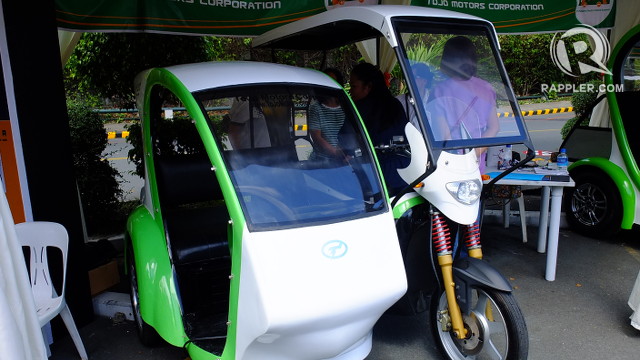SUMMARY
This is AI generated summarization, which may have errors. For context, always refer to the full article.
MANILA, Philippines – The government is shelling out P505.6 million for a project that aims to put 100,000 electric tricycles or e-trikes on Philippine roads by 2017. (READ: ‘One million electric vehicles in PH by 2020’)
On Tuesday, March 11, the Department of Budget and Management (DBM) announced that it released the amount to the Department of Energy (DOE). The funds cover the government’s 2014 financial commitment for the e-trike project, a joint initiative with the Asian Development Bank (ADB) through the organization’s Clean Technology Fund.
The amount will pay for the procurement of e-trikes, and the selection of project implementation consultants. It will cover payment of taxes and the conduct of surveys among local government units, tricycle operators and drivers, and other stakeholders who want the e-trikes in their streets.
The fund will also support the purchase of office equipment (P70,000) and information tcchnology (IT) equipment (P530,000).
The entire project, to be implemented until 2017, has a total cost of P21.7 billion. The government will contribute P4.26 billion; the balance will be funded by P17.2 billion in loans and P216 million in grants.
First 3,000 units in Luzon
The DOE is set to announce the name of the e-trike manufacturer who won the contract to produce the project’s first 3,000 e-trikes.
Among those who participated in the August 22, 2013 auction were Taiwan’s Teco Electric & Machinery Co Ltd, Japanese company Uzushio Electric Co Ltd, and Eco One Co from Korea.
The first batch of e-trikes will go to LGUs in Luzon.
“The e-tricycles will be distributed all over the country starting with 500 in Mandaluyong City, 500 in Manila, 500 in Tarlac, and others,” said ADB principal energy specialist Sohail Hasnie.
Another 12,000 e-trikes will be bidded out within the year, added Hasnie. ADB and DOE will determine which LGUs will be the recipients of the tricycles based on the demand for tricycles in the LGU and other factors.
The undertaking aims to provide ease in the transition from conventional to electric tricycles, for the drivers and operators themselves.
One way is to implement a “no cash upfront” system. Here, a driver who wants to make the transition doesn’t need to give a downpayment to purchase an e-trike valued at around P250,000 to P300,000. Instead, he would pay a monthly amortization using the money saved from not having to buy gasoline. E-vehicles run on batteries and are unaffected by changing fuel prices.
Based on projections, a driver will be able to pay in full within 5 years, said Hasnie.
Industry hub
E-vehicles have earned a good reputation from many environmentalists because their non-reliance on fuel means they do not emit harmful chemicals into the air. According to the Department of Environment and Natural Resources (DENR), 80% of air pollution in Metro Manila comes from motor vehicles. (READ: Outdoor air pollution a leading cause of cancer – WHO)
E-vehicle industry players, both local and foreign, expect the Philippines to become an e-vehicle hub in Southeast Asia because of both government and private sector support, and the important role of mass transportation in the lives of Filipinos.
The Makati electric jeepney system was the first working city-wide model in Southeast Asia and paved the way for growing acceptance for the mode of transport in the Philippines.
E-shuttles are also set to ply Quezon City roads come April. – Rappler.com
Add a comment
How does this make you feel?

There are no comments yet. Add your comment to start the conversation.